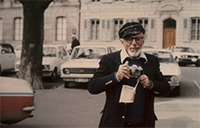York University geography Professor Emeritus Roy I. Wolfe, a “pioneer in tourism geography,” an award-winning teacher and a lover of classical music, died Nov. 15. He was 96.
Prof. Wolfe joined York University in 1967 and taught for 17 years before retiring. He loved teaching and the students loved him back. He developed courses in recreational and transportation geography and taught regional geography of Canada, as well as graduate courses.

He was also known for his “careful, critical scrutiny of essays” and was a fine stylist, says his York University colleague John Warkentin. He even went so far as to write a seven-page directive in 1975 on how to write better essays, called “Hints, Admonitions, and Downright Threats from a Jaded Reader of Too Many Sloppy Essays.” In 1981, he won an Ontario Confederation of University Faculty Associations Teaching Award.
Prof. Wolfe’s trailblazing work in tourism geography focused in particular on interactions between urban centres and nearby recreation areas, including what is known as Ontario’s cottage country. In 1988, the Association of American Geographers honoured Prof. Wolfe by establishing the annual Roy Wolfe Award “for outstanding contributions to the field and discipline of Recreation, Tourism and Sport Geography.” The award has been won by geographers from Canada, Finland, New Zealand and the United States.
Before coming to York, Prof. Wolfe was a strategic planner and researcher with the Ontario Department of Highways for 14 years.
But there was far more to Prof. Wolfe than work and teaching. He listened to Mozart, Schubert, Beethoven and Mahler in his head all his life, and he was singing Gilbert and Sullivan songs until the end, despite having been profoundly deaf since 1947. He spoke Yiddish, English, French and German, and could lip read in all of them, sometimes even distinguishing regional accents in English. He recalled Shakespeare sonnets and parodies of romantic poems from memory with equal delight, and calculated logarithms in his head for recreation. He was an astute film critic, partly because he depended on stories being told visually. And as Warkentin says, “Roy’s candour and mischievous sense of humour, skillfully deployed in the art of high gamesmanship when playing recreational tennis, made him a formidable contestant on Toronto tennis courts.”
Born Israel Wolbromski in Staszow, Poland on Nov. 19, 1917, Prof. Wolfe came to Canada in 1922. Although his education was interrupted by the Depression and the Second World War, in 1956 he completed his PhD in geography on summer cottages in the province at the University of Toronto. After leaving the Department of Highways, he remained active as a planning consultant, participating in nearly two dozen tourism-related projects for governments in Canada, the United States and the United Kingdom. He had two pieces of advice for planners, which exemplified his approach to life and to politics, as well as his work: first, leave people alone; second, you can’t leave people alone.
Predeceased by his wife Rosemary, Prof. Wolfe leaves four children, six grandchildren and two great grandchildren.
A memorial will be held Saturday, Dec. 13, at 3pm at Kensington Gardens, 45 Brunswick Ave., Toronto.
Donations may be made to Kensington Gardens or to the Roy I. Wolfe Scholarship fund at York University for students with a disability.


